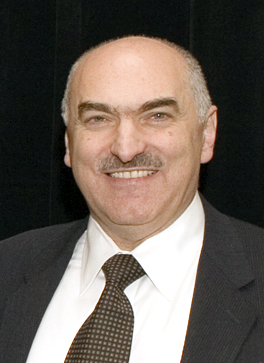 Keynotes
Keynotes
Keynote 1: Incentives and games in large scale mobility
Abstract:
This talk presents inference, control, and game-theoretic algorithms developed to improve traffic flow in transportation networks. The talk will investigate various factors that intervene in decisions made by travelers in large scale urban environments. We will discuss disruptions in demand due to the rapid expansion of the use of “selfish routing” apps, and how they affect urban planning. These disruptions cause congestion and make traditional approaches of traffic management less effective. Game theoretic approaches to demand modeling will be presented. These models encompass heterogeneous users (some using routing information, some not) that share the same network and compete for the same commodity (capacity). Results will be presented for static loading, based on Nash-Stackelberg games, and in the context of repeated games, to account for the fact that routing algorithms learn the dynamics of the system over time when users change their behavior. The talk will present some potential remedies envisioned by planners, which range from incentivization to regulation.
Bio:
 Alexandre Bayen is the Liao-Cho Professor of Engineering at UC Berkeley, in the departments of Electrical Engineering and Computer Science and Civil and Environmental Engineering. He is the Director of the Institute of Transportation Studies, and a Faculty Scientist in Mechanical Engineering at the Lawrence Berkeley National Laboratory, where he is the Director of the Transportation Initiative. He received a BS from Ecole Polytechnique, France, and an MS and PhD from Stanford University. He has worked at NASA, and at the Department of Defense in France, where he holds the rank of Major. He has published two books and over 200 peer refereed journal and conference publications. His research has been covered hundreds of times in the mainstream media. He is the recipient of several awards, including CAREER (NSF), PECASE (White House), Ruberti Prize (IEEE), Huber Prize (ASCE), TRANNY (CTF) and Gilbreth Lecture (NAE).
Alexandre Bayen is the Liao-Cho Professor of Engineering at UC Berkeley, in the departments of Electrical Engineering and Computer Science and Civil and Environmental Engineering. He is the Director of the Institute of Transportation Studies, and a Faculty Scientist in Mechanical Engineering at the Lawrence Berkeley National Laboratory, where he is the Director of the Transportation Initiative. He received a BS from Ecole Polytechnique, France, and an MS and PhD from Stanford University. He has worked at NASA, and at the Department of Defense in France, where he holds the rank of Major. He has published two books and over 200 peer refereed journal and conference publications. His research has been covered hundreds of times in the mainstream media. He is the recipient of several awards, including CAREER (NSF), PECASE (White House), Ruberti Prize (IEEE), Huber Prize (ASCE), TRANNY (CTF) and Gilbreth Lecture (NAE).
Keynote 2: Autonomous Vehicles and Public Transit: Partners in Urban Mobility
Abstract:
Like many other domains, transportation is undergoing deep and significant transformation, seeking to fulfill the promise of connected mobility for people and goods, while limiting its carbon footprint. The advent of autonomous vehicles has the potential to change the economics ownership and use of private automobiles, likely accelerating trends towards greater use of app-based ride hailing and/or sharing by private TNCs (Transportation Network Companies). We outline and interpret developments in connected and autonomous vehicle technologies, in the broad context of the Internet of Things (IoT) and smart cities; identify likely deployment scenarios; and highlight implications and opportunities for emerging service delivery models, particularly with regard to the respective roles of the public and private sectors. Several potential business models with varying degrees of ride sharing and public vs. private involvement in the delivery of mobility as a service (MaaS) are presented. By reinventing themselves as mobility agencies, public transit properties can leverage these developments to focus resources on providing high-quality services along high-density lines, resulting in significant improvement in overall urban and regional mobility.
Bio:
 Dr. Hani S. Mahmassani holds the William A. Patterson Distinguished Chair in Transportation at Northwestern University, where he is Director of the Northwestern University Transportation Center, and Professor in Civil and Environmental Engineering, with joint appointments in Industrial Engineering and Management Sciences, and Managerial Economics and Decision Sciences in the Kellogg School of Management. Prior to Northwestern, he served on the faculties of the University of Maryland and the University of Texas at Austin. He has over 35 years of professional, academic and research experience in the areas of intelligent transportation systems, freight and logistics systems, multimodal systems modeling and optimization, pedestrian and crowd dynamics and management, traffic science, demand forecasting and travel behavior, and real-time operation of transportation and distribution systems. He has served as principal investigator on over 150 funded research projects sponsored by international, national, state, and metropolitan agencies and private industry. He is past editor-in-chief and current associate editor of Transportation Science, senior editor of IEEE Transactions on Intelligent Transportation Systems, and founding associate editor of Transportation Research C: Emerging Technologies. He has served in an advisory capacity to various institutes and programs, and performed several program assessments of leading international research institutes and corporate R&D departments. He is a past president of the Transportation Science Section of the Institute for Operations Research and the Management Sciences, and a past President of the International Association for Travel Behavior Research. He was the recipient of a Distinguished Alumnus Award of the Faculty of Engineering and Architecture of the American University of Beirut in 2006, the Intelligent Transportation Systems Outstanding Application Award of the Institute of Electrical and Electronics Engineers in 2010, and the Transportation Research Board’s Thomas Deen Distinguished Lectureship in 2016. He was elected Emeritus member of the Transportation Research Board (of the National Academies) committees on Telecommunications and Travel Behavior, Transportation Network Modeling Committee, and Traveler Behavior and Values. Mahmassani received his PhD from the Massachusetts Institute of Technology in transportation systems and MS in transportation engineering from Purdue University.
Dr. Hani S. Mahmassani holds the William A. Patterson Distinguished Chair in Transportation at Northwestern University, where he is Director of the Northwestern University Transportation Center, and Professor in Civil and Environmental Engineering, with joint appointments in Industrial Engineering and Management Sciences, and Managerial Economics and Decision Sciences in the Kellogg School of Management. Prior to Northwestern, he served on the faculties of the University of Maryland and the University of Texas at Austin. He has over 35 years of professional, academic and research experience in the areas of intelligent transportation systems, freight and logistics systems, multimodal systems modeling and optimization, pedestrian and crowd dynamics and management, traffic science, demand forecasting and travel behavior, and real-time operation of transportation and distribution systems. He has served as principal investigator on over 150 funded research projects sponsored by international, national, state, and metropolitan agencies and private industry. He is past editor-in-chief and current associate editor of Transportation Science, senior editor of IEEE Transactions on Intelligent Transportation Systems, and founding associate editor of Transportation Research C: Emerging Technologies. He has served in an advisory capacity to various institutes and programs, and performed several program assessments of leading international research institutes and corporate R&D departments. He is a past president of the Transportation Science Section of the Institute for Operations Research and the Management Sciences, and a past President of the International Association for Travel Behavior Research. He was the recipient of a Distinguished Alumnus Award of the Faculty of Engineering and Architecture of the American University of Beirut in 2006, the Intelligent Transportation Systems Outstanding Application Award of the Institute of Electrical and Electronics Engineers in 2010, and the Transportation Research Board’s Thomas Deen Distinguished Lectureship in 2016. He was elected Emeritus member of the Transportation Research Board (of the National Academies) committees on Telecommunications and Travel Behavior, Transportation Network Modeling Committee, and Traveler Behavior and Values. Mahmassani received his PhD from the Massachusetts Institute of Technology in transportation systems and MS in transportation engineering from Purdue University.
Keynote 3: Learning, Decision-Making, and Incentives using Mobility Data: Case Studies, Challenges, and Opportunities
Abstract:
In this talk, we focus on both the possibilities and limitations of leveraging new data streams in learning, decision-making, and incentive design to improve mobility access and efficiency in cities. Specifically, we highlight some interesting case-studies where cities have had successes or failures when experimenting with new solutions and technologies. Building from these case-studies, we identify both challenges and opportunities with the hopes of stimulating a fruitful conversation during the breakout sessions and panels.
Bio:
 Lillian Ratliff is an Assistant Professor in EE at the University of Washington, Seattle, prior to which she was a Postdoctoral Researcher in EECS at the University of California, Berkeley where she also obtained her Ph.D. in 2015. She obtained a B.S. in Mathematics (2008) and a B.S. (2008) and M.S. (2010) in EE all from the University of Nevada, Las Vegas. Her research interests lie at the intersection of game theory, optimization, and learning. She is the recipient of the National Science Foundation Graduate Research Fellowship (2009) and the CISE Research Initiation Initiative Award (2017).
Lillian Ratliff is an Assistant Professor in EE at the University of Washington, Seattle, prior to which she was a Postdoctoral Researcher in EECS at the University of California, Berkeley where she also obtained her Ph.D. in 2015. She obtained a B.S. in Mathematics (2008) and a B.S. (2008) and M.S. (2010) in EE all from the University of Nevada, Las Vegas. Her research interests lie at the intersection of game theory, optimization, and learning. She is the recipient of the National Science Foundation Graduate Research Fellowship (2009) and the CISE Research Initiation Initiative Award (2017).
